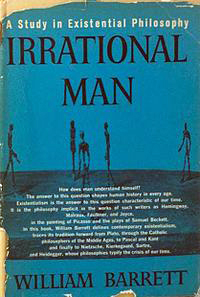Irrational Man

Cover of the first edition
|
|
| Author | William Barrett |
|---|---|
| Country | United States |
| Language | English |
| Subject | Existentialism |
| Published | 1958 (Doubleday) |
| Media type | Print (Hardcover and Paperback) |
| Pages | 278 (1977 edition) 314 (1990 reprint) |
| ISBN | |
Irrational Man: A Study In Existential Philosophy is a 1958 book by philosopher William Barrett, in which Barrett explains the philosophical background of existentialism and provides a discussion of several major existentialist thinkers, including Søren Kierkegaard, Friedrich Nietzsche, Martin Heidegger, and Jean-Paul Sartre. Irrational Man helped to introduce existentialism to the English speaking world and has been identified as one of the most useful books that discuss the subject, but Barrett has also been criticized for endorsing irrationality and for giving a distorted and misleading account of Georg Wilhelm Friedrich Hegel.
Barrett provides an account of the philosophical tradition to which existentialism was a reaction, discussing the views of philosophers from Plato to Hegel, and tracing the development of ideas about being, ontology, and metaphysics. He also attempts to explain how developments in science, economics, and religion provided the background to existentialism. According to Barrett, "With Protestantism begins that long modern struggle, which reaches its culmination in the twentieth century, to strip man naked." In his view, "as the modern world moves onward, it becomes more and more secularized in every department of life; faith consequently becomes attenuated, and Protestant man begins to look more and more like a gaunt skeleton, a sculpture by Giacometti. A secular civilization leaves him more starkly naked than the iconoclasm of the Reformation had ever dreamed." Barrett writes that during the modern period, there has emerged "an image of man himself that bears a new, stark, more nearly naked, and more questionable aspect. The contraction of man's horizons amounts to a denudation, a stripping down, of this being who has now to confront himself at the center of all his horizons. The labor of modern culture, wherever it has been authentic, has been a labor of denudation." Surveying trends in art, Barrett writes that the Dada movement was "one of the valid eruptions of the irrational in this century."
...
Wikipedia
